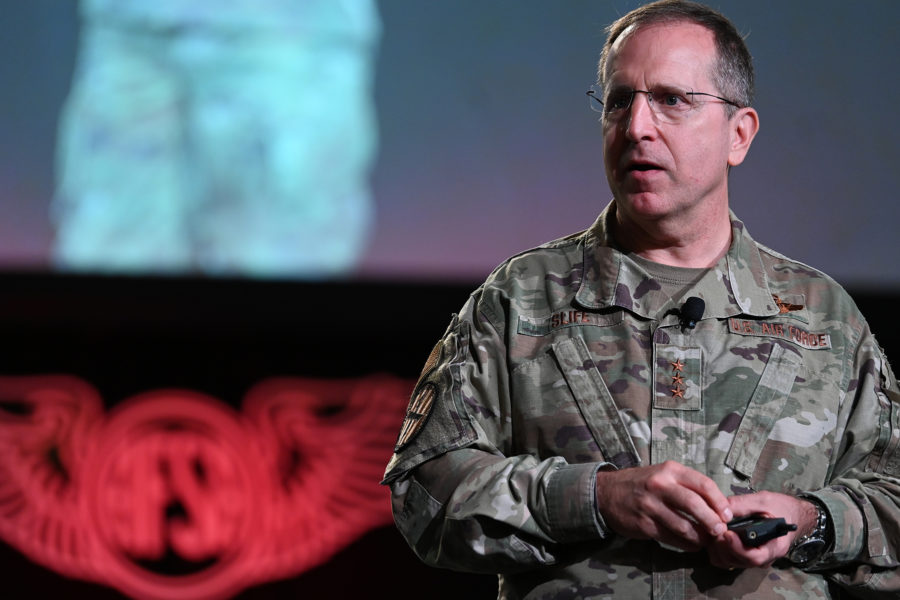President Joe Biden has nominated Lt. Gen. James C. Slife for promotion to general and appointment as Vice Chief of Staff of the Air Force, the service’s No. 2 job, the Pentagon announced Sept. 6.
At a Defense News conference earlier in the day, Slife, who currently serves as deputy chief of staff for operations, was asked to comment on reports he would receive the nomination to succeed Gen. David W. Allvin as Vice Chief.
“I’ve got full-time work where I am right now,” Slife said. “So I guess I’ll give that some more thought once we get further down the process.”
Allvin was nominated July 26 to become Chief of Staff, set to succeed Gen. Charles Q. Brown Jr., who is nominated to be the next chairman of the Joint Chiefs of Staff. In turn, Maj. Gen. Adrian L. Spain has been tapped to pin on a third star and succeed Slife as deputy chief of staff of operations, the DOD announced.
Slife’s three previous assignments before his current job were all in special operations:
- Commander of Air Force Special Operations Command
- Vice commander of U.S. Special Operations Command
- Chief of Staff at Headquarters, U.S. Special Operations Command
He has had 14 other assignments in special operations, having been a UH-1 and MH-53J Pave Low helicopter pilot, and he has commanded special ops units at the squadron, group and wing levels.
If confirmed, Slife will be the first AFSOC commander to become Vice Chief or Chief of Staff since the major command was founded in 1990. Between him and Allvin, the Air Force would have no fighter or bomber pilot in either of its top two jobs, an exceedingly rare occurrence.
The two would take over the Air Force at a key transition moment—Air Force Secretary Frank Kendall has called for a sweeping review of the service’s readiness for potential conflict with China, leaders have pushed to retire old aircraft and invest in new platforms, and the branch has increasingly centered its operations around the Agile Combat Employment concept, in which teams of Airmen disperse to operate from remote or austere locations.
Slife’s other Air Force assignments include a tour with Air Force legislative liaison as an intern, a Secretary of Defense Corporate Fellow, and a stint as the director of the Air Force’s Emerging Capabilities Division from 2007-2009. He received a bachelor’s degree in aerospace engineering from Auburn University, Ala.; a master’s degree in aerospace science from Embry-Riddle Aeronautical Univ., Fla., and a master’s in administration science from George Washington University, D.C.
In addition to Slife and Spain, the Pentagon announced four other Air Force general officer nominations Sept. 6:
- Maj. Gen. Sean M. Farrell, to become a lieutenant general and deputy commander of U.S. Special Operations Command
- Col. Matthew S. Allen, to become a one-star and stay in his current job as director of legislative affairs for SOCOM
- Col. Trent C. Davis, to become a one-star and stay in his current job as command chaplain for Air Combat Command
- Col. Lawrence T. Sullivan, to become a one-star and stay in his current job as the principal military assistant to the secretary of defense
DOD also announced Biden has nominated Space Force Maj. Gen. David N. Miller Jr. to pin on a third star and become the next head of Space Operations Command. Miller is currently special assistant to the vice chief of space operations, but before that, he was director of operations for U.S. Space Command.
If confirmed, Miller would succeed Lt. Gen. Stephen N. Whiting, SpOC’s first ever commander, who has been nominated to lead U.S. Space Command.
All these nominations, however, face an uncertain timeline. Sen. Tommy Tuberville (R-Ala.) has had a legislative hold on all general and flag officer nominations since March 8, preventing the Senate from approving them all at once by voice vote. Tuberville placed his hold to protest a Pentagon policy to provide paid leave and travel funds for troops requiring reproductive services, including abortions, who are based in states where those services are not available.
Hundreds of nominees have piled up over the last several months. The Senate could hold roll-call votes on individual nominees, but the Democrats in the majority have declined to do so, saying it would take months of floor time to vote on all of them and would encourage further blockades by other lawmakers unhappy over policy matters.

